In the attempt to integrate disciplines that study natural and social systems, I think Hannah Holleman’s focus on methodology is an important starting point. At their best, I find both systems ecology and Marxist social science powerful because of their methods of inquiry, which I see as strikingly similar. They both look at phenomena as interconnected, systemic, historical and dialectical/dynamic. They both look for structural causes of behavior, that is, arising from the way systems are organized causally. So in my view the best way to integrate the disciplines is on the basis of that common analytical framework and method of inquiry. When workers in each learn elements of the discipline of the other, they will soon be delighted to see how much they have in common methodologically.
That said, I have not yet seen a good attempt to integrate the two disciplines. Levins and Lewontin’s work [1] reveals enough knowledge of both to do the job, and the integration is implicit in their writing, but they have not articulated it formally. At least they recognize the importance of the work of H.T. Odum, whose pioneering work laid the foundation of modern systems ecology, and have absorbed its method in their work.
Odum [2] has begun an integration using an analytical framework for energy flow in systems, which follows the same Laws of Thermodynamics in all types of systems. For example, t?he growth capacity of both a forest and? an empire can be understood in terms of the available energy ?and how the system channels it?. Odum appears to have a critical understanding of capitalism as well, for his analysis rarely is inhibited by the usual false assumptions of conventional economics or political science about the laws of nature.
John Bellamy Foster and Hannah Holleman’s The theory of unequal ecological exchange: a Marx-Odum dialectic represents a good next step. But it is long and tediously academic and needs a summary approach without the endless citations.
They and others like Rebecca Clausen have tried to develop ‘metabolic rift’ into a bridging concept. That’s a step forward, but only a start on integration.
Even Holleman and Foster and others? (Kovel, OConnor, Burkett, etc.) expend too much effort on a “reconstruction and reaffirmation of Marx’s own critical-ecological outlook”. Little has come of that gleaning effort other than a confirmation of Marx’s materialist assumptions and a few indicators of ecological concerns. This should not be surprising because ecology did not emerge as a coherent discipline until long after his death. Engels’ Dialetics of Nature was a valiant attempt but premature due to the state of the science at that time (1883).
Other than the attempts described above, unfortunately I see a lot of analysis being driven only by increasing awareness of present social and environmental disintegration and not by adoption of appropriate methods of inquiry. Most ecologists and environmentalists tend to think that because they can see signs of increasing economic crisis they can analyze the situation without studying Marxist methods. Most Marxists who see intensifying ecological crisis think they can study the situation properly without learning systems ecology and the laws of nature. So it becomes another example of the classic problem of the six blind men and the elephant.
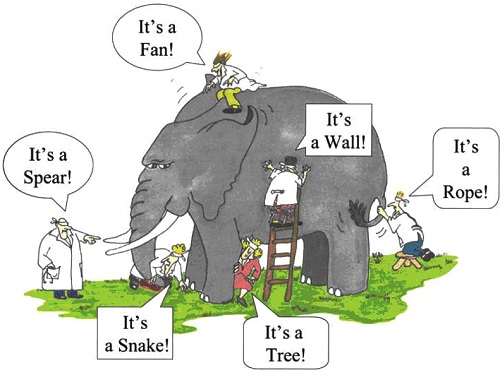
|
To retrace steps historically, one of the early landmark attempts at integrated analysis was William Catton’s Overshoot: The Revolutionary Basis of Ecological Change, published in 1982. Catton was a social scientist who realized the importance of learning ecology as a discipline. Although not a Marxist, he saw that no revolutionary politics could succeed without an understanding of and obedience to the laws of nature. Unlike most social scientists, he realized that humanity in the last analysis is just one species among many, and is subject to the same constraints as all others in the way it uses or misuses natural resources. So he predicted that all attempts at revolution organized by peasants or workers will be upstaged and potentially overruled by a revolution imposed by the present process of overshoot of planetary carrying capacity, which will lead inevitably to decline of industrial civilization as we know it.?
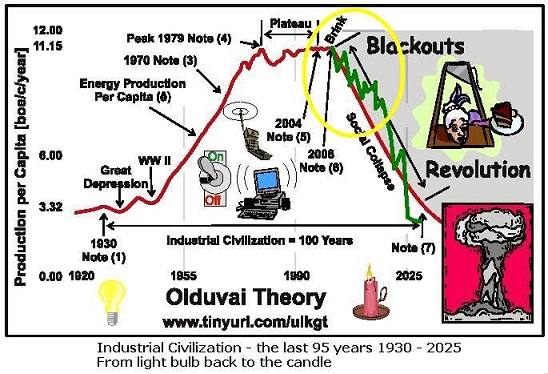
|
A key to understanding why overshoot is happening is the growth imperative built into capitalism. Theoretically, societies could impose limits to growth, but only if capitalism is replaced with a system that permits such politics. Endless growth is also built into biological imperatives to reproduce and expand population built into our DNA. In that respect we are no different from virtually all other species. Hence the biological imperative is manifest and plays a role in the rise and fall of civilizations long before the advent of capitalism.
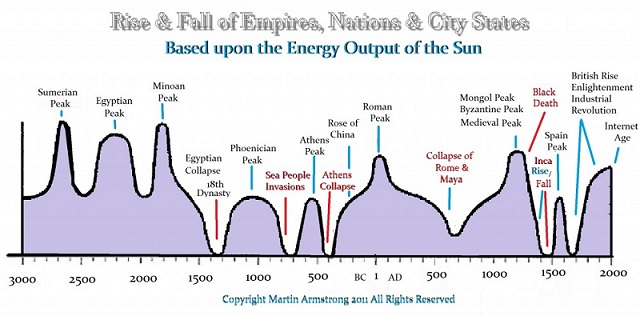
|
However, the structurally created growth imperative of capitalism amplified the biological imperative. How does this imperative function? Briefly summarizing the work of Marxist and other critical social science, it derives from two key ‘rules’ of capitalist social organization: unrestrained economic competition and a system of allocation of capital investment that requires rent – lending at interest – formerly known as usury. The first rule compels businesses to grow to protect market share from competitors. To constantly grow they must borrow investment capital. The second requires enough growth to create the surplus needed to pay the interest on the borrowed capital, and eventually pay back the principal.
Added to the biological imperative and the systemic impetus to growth in capitalism is the historical convergence of the rise of capitalism with the development of a source of energy to power growth that was far cheaper and more concentrated than the sun, the power source of all previous growth. Until it brought civilization to the present conundrum – the rapid depletion and peaking of production of fossil energy and many other raw materials, this fossil fuel bonanza eliminated a major limitation on the growth of the human species and its economies.
The historical result is that within the last several centuries human populations have expanded to the point that human consumption of the planetary resource base overshoots earth’s carrying capacity two to four times. It is manifest in the rapid depletion of the raw materials available to maintain industrial civilization and in the attendant damage to essential ecological services. One consequence appears in the gradual decrease in growth of the global economy over recent decades. Most economists and other social scientists (including most Marxist social scientists) have tended to ignore this trend by theoretically “externalizing” the voracious economic effect on raw materials inputs because their disciplinary tradition assumes these inputs to be endless. Because nothing runs without energy, World GDP decline has followed the gradual end to cheap energy. The rate of global economic growth, running over 10% in the ‘golden age’ of the l950s, has dropped over the ensuing decades to close to zero in the mature industrial economies.
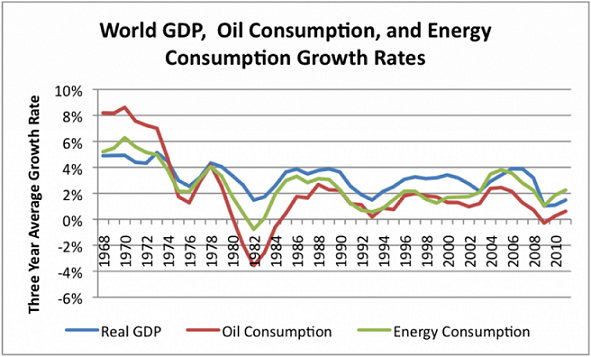
|
Because energy is the master resource, its increasing scarcity eventually raises its cost and reduces extraction of all other essential raw materials, most of which also show signs of increasing scarcity. Many minerals are close to or past peak production.
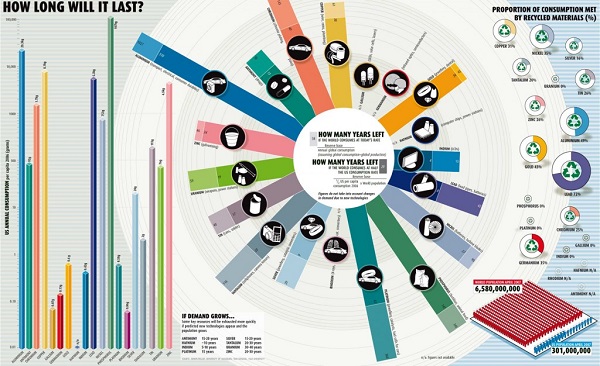
|
The overall consequence of planetary overshoot will be not only the end of growth, but the permanent degrowth of the industrial economy from loss of inputs including lost ecological services like clean water and air and fertile soil. Unlike problems in the past that could be fixed with technologies based on cheap energy and raw materials, this situation has no solution. Society must adapt to a powering down of industrial civilization. Neither conventional economic analysis nor ecological science alone can facilitate the adaptation, because of the limitations of these disciplines, studied separately, outlined above. We need a combination of ecological awareness of overshoot and a critical appreciation of the causes of overshoot in the capitalist system. From this perspective, the rapid integration of critical social science and systems ecology a la Odum becomes the new imperative.
Assuming that humanity finally gains a holistic, social-ecological understanding of how the world works, and the conundrums it presents, the next question is the political likelihood and options for acting on that understanding within the present global political economic system. To address that question requires a historically informed analysis of the system – how it got to be the way it is today.
Civilization or barbarism: When freedom becomes license
We are told that the beginning of agriculture was the beginning of civilization. What nonsense. If the label is to mean anything, the society we apply it to should be civilized, or at least aim to be. The ruling strata have hijacked the term, as they have with many words and phrases they use to indoctrinate, and used it to cover a new era of barbarism. As historians of all political stripes have observed, the advent of agriculture simply provided a windfall of new surplus that an already powerful minority expropriated and concentrated, creating affluent urban centers of imperial exploitation, keeping peripheries in relative poverty. Most all of the resultant attempts at civilization rose and then collapsed, as previously depicted in the timeline – The Rise and Fall of Empires. These city-states/empires became the signature of a new era of history, growing without restraint into cancerous pustules on the skin of the biosphere, and characterized by massive social and ecological exploitation. And we call that civilization?
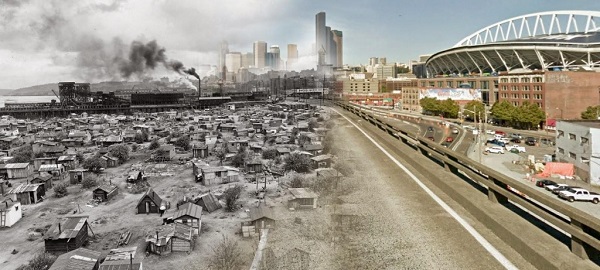
|
So how should we define civilization and evaluate present efforts or lack thereof? When pressed, even rank individualists agree that our species is a social animal. Historically, political frameworks that failed to value society as a whole and to limit individual liberty accordingly have tended toward conflict, social chaos and what political philosopher Thomas Hobbes famously called a war of all against all, or barbarism. Thus all attempts to become more civilized in human history have sought a balance between freedom and license that would produce the greatest good for the greatest number – that is, a balance between individual freedom and social constraints in law and ultimately cultural norms that work to optimize the common good. I will use that measure of a balance to look critically at the present situation of humanity and its political institutions.
The dominant form of large scale social organization in the world today is capitalism. The most extreme form of capitalism – producing the greatest good for the smallest number - is the US version. Building on the assumption of individual salvation in the Protestant ethic, capitalism serves the class that created it for its benefit by pushing society to accept the private interest of individuals as its paramount value. From the perspective of civilization as a fair balance between liberty and license, therefore capitalism is a social pathology. My thesis will be that, as the new barbarians, the US Empire and its vassal industrialized economies are spreading that pathology throughout global humanity, and that in the US this pathology has infected both the political left and the right, each in different ways. Efforts to restore the balance with mixed economies have met with limited success in different times and places, but enough to warrant brief mention herein as well.
The capitalist ideal embraces license as a way of organizing society – by putting its economy and its resource base under private control. Because its economist priesthood preaches unlimited growth of both the economy and private wealth with no public restraint, over the last five centuries this form of political economy has penetrated in a virulent imperial form almost everywhere on the planet. The damage to the quality of life of global masses has been so great as to spark a reaction in the direction of public control of economies, culminating in the first experiments with socialism on a nationwide scale, and the dilution of some of the capitalist national economies into mixed economies, at least for a time, notably in Western Europe and the global south. The damage of unrestrained exploitation of the global natural resource base has caused enough depletion of finite resources and damage to essential ecosystem processes to threaten the extinction of our species, but the reaction in the direction of reform has yet to achieve much at the level of national government.
Attempted pathways to civilization
Those in the West who consider themselves liberals have tried to amend capitalism to make it more socially just – one that achieves a better distribution of power and wealth. They have not understood the degree of concentration of wealth and power that has occurred under capitalism, thus their gains have been illusory, amounting to little more than trickle down from the ruling strata in temporary times of prosperity, much of it gained from imperial pillage of the global south.
Moreover, liberals exhibit little awareness that the present industrial level of production of wealth is cannibalistic of the planetary resource base it relies on, and is therefore suicidal. As already described, Industrial civilization based on ravenous consumption of essential but finite resources is like the proverbial sawyer cutting the branch he is sitting on.
On the other hand, those who see themselves as political conservatives have traditionally sought to maximize individual freedom. Generally they exhibit no understanding of how those chickens come home to roost: over time a minority takes advantage of the freedom to capture most of the wealth and power and so-doing reduces the freedom and quality of life of the majority, reducing the majority to wage slavery for example. Most conservatives, like the liberals, also fail to see the dead end of a civilization that pursues endless growth.
These liberal and conservative conceptions of the way our society works are typical of the false narratives that the ruling strata use to pacify the public. They will not address the unprecedented dual challenge of peak industrial civilization and severe concentration of wealth that is revealed by the integrated insights of critical political economy and systems ecology. These insights suggest that we need two-fold system change: a political economy that replaces capitalism and replaces industrial economies based on depletion and damage of the resource base. We need to shift our approach from reductionist management of our impact inside of that system to a holistic stance that recognizes the need to change the system itself. If, when and even whether that kind of change is possible is the subject of a whole other paper. A growing literature on the subject exists. I have suggested some scenarios in other writings. [3]
Notes
[1] For example, Lewontin, Richard and Richard Levins, 2007. Biology Under the Influence, Monthly Review Press.
[2] Odum, H.T., 2007. Environment, Power and Society for the Twenty-first Century, Columbia University Press.
[3] Scenarios of Political Response to Energy Descent Crises
Food Production Systems in the Decline of the Industrial Age: A Call for a Socio-ecological Synthesis
Cities and Suburbs in the Energy Descent: Thinking in Scenarios
Visioning County Food – Part One
Visioning County Food – Part Two
Visioning County Food – Part Three
Visioning County Food – Part Four
Visioning County Food – Part Five
Visioning County Food – Part Six
ABOUT THE AUTHOR
Karl North has been a student, a farmer, a business owner, and a teacher. He explores and demonstrates the use of systems thinking learning and design tools for a sustainable future. Motivating his work is an underlying assumption that the end of the petroleum era will force fundamental changes in all major human institutions, and that the changes will be most painful if we fail to plan and adapt to meet them.
|